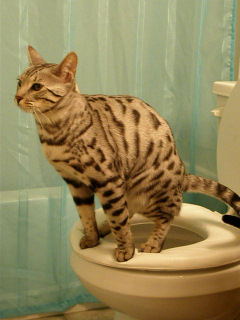Reasons Flushing Cat Poop Down Your Toilet Is Bad - Suggestions for Proper Handling
Reasons Flushing Cat Poop Down Your Toilet Is Bad - Suggestions for Proper Handling
Blog Article
What're your thoughts concerning Don’t flush cat feces down the toilet?

Introduction
As feline owners, it's essential to be mindful of just how we deal with our feline good friends' waste. While it may seem convenient to flush pet cat poop down the bathroom, this practice can have damaging repercussions for both the setting and human wellness.
Ecological Impact
Purging pet cat poop introduces harmful virus and parasites into the water system, posturing a considerable risk to marine ecological communities. These contaminants can negatively affect aquatic life and concession water high quality.
Wellness Risks
In addition to ecological concerns, flushing feline waste can also pose health and wellness threats to humans. Pet cat feces might contain Toxoplasma gondii, a bloodsucker that can create toxoplasmosis-- a potentially severe ailment, particularly for expectant ladies and people with damaged immune systems.
Alternatives to Flushing
Fortunately, there are much safer and a lot more responsible means to take care of pet cat poop. Take into consideration the following alternatives:
1. Scoop and Dispose in Trash
The most typical method of throwing away feline poop is to scoop it into an eco-friendly bag and toss it in the trash. Make certain to make use of a committed clutter scoop and take care of the waste quickly.
2. Usage Biodegradable Litter
Opt for biodegradable pet cat litter made from products such as corn or wheat. These trashes are environmentally friendly and can be securely dealt with in the trash.
3. Hide in the Yard
If you have a backyard, take into consideration hiding feline waste in an assigned area far from vegetable gardens and water sources. Make sure to dig deep enough to stop contamination of groundwater.
4. Set Up a Pet Waste Disposal System
Buy a family pet waste disposal system particularly created for pet cat waste. These systems use enzymes to break down the waste, lowering odor and environmental influence.
Conclusion
Accountable animal ownership prolongs beyond offering food and sanctuary-- it additionally includes appropriate waste management. By refraining from purging feline poop down the commode and selecting alternative disposal techniques, we can minimize our ecological footprint and shield human health and wellness.
Why Can’t I Flush Cat Poop?
It Spreads a Parasite
Cats are frequently infected with a parasite called toxoplasma gondii. The parasite causes an infection called toxoplasmosis. It is usually harmless to cats. The parasite only uses cat poop as a host for its eggs. Otherwise, the cat’s immune system usually keeps the infection at low enough levels to maintain its own health. But it does not stop the develop of eggs. These eggs are tiny and surprisingly tough. They may survive for a year before they begin to grow. But that’s the problem.
Our wastewater system is not designed to deal with toxoplasmosis eggs. Instead, most eggs will flush from your toilet into sewers and wastewater management plants. After the sewage is treated for many other harmful things in it, it is typically released into local rivers, lakes, or oceans. Here, the toxoplasmosis eggs can find new hosts, including starfish, crabs, otters, and many other wildlife. For many, this is a significant risk to their health. Toxoplasmosis can also end up infecting water sources that are important for agriculture, which means our deer, pigs, and sheep can get infected too.
Is There Risk to Humans?
There can be a risk to human life from flushing cat poop down the toilet. If you do so, the parasites from your cat’s poop can end up in shellfish, game animals, or livestock. If this meat is then served raw or undercooked, the people who eat it can get sick.
In fact, according to the CDC, 40 million people in the United States are infected with toxoplasma gondii. They get it from exposure to infected seafood, or from some kind of cat poop contamination, like drinking from a stream that is contaminated or touching anything that has come into contact with cat poop. That includes just cleaning a cat litter box.
Most people who get infected with these parasites will not develop any symptoms. However, for pregnant women or for those with compromised immune systems, the parasite can cause severe health problems.
How to Handle Cat Poop
The best way to handle cat poop is actually to clean the box more often. The eggs that the parasite sheds will not become active until one to five days after the cat poops. That means that if you clean daily, you’re much less likely to come into direct contact with infectious eggs.
That said, always dispose of cat poop in the garbage and not down the toilet. Wash your hands before and after you clean the litter box, and bring the bag of poop right outside to your garbage bins.
https://trenchlesssolutionsusa.com/why-cant-i-flush-cat-poop/

I ran across that blog post about Can You Flush Cat Poo or Litter Down the Toilet? when doing a lookup on the web. In case you liked our blog post please don't forget to pass it around. We thank you for reading our article about Can You Flush Cat Poo or Litter Down the Toilet?.
Go Deal Now Report this page